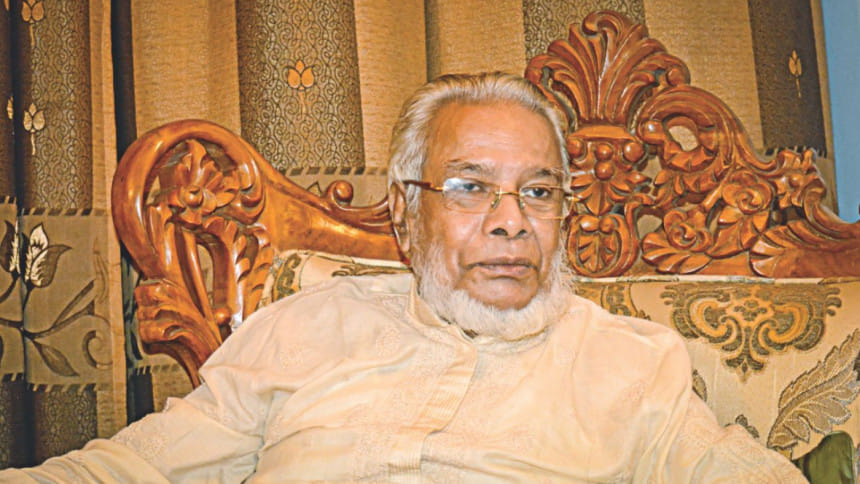A long way gone

Former Chief Justice of Bangladesh Mr. Mohammad Fazlul Karim was born on 30th September, 1943 in Chittagong. Justice Karim, having obtained LLB from the University of Dhaka, was called to the Bar of England & Wales in 1969 by the Honourable Society of Lincoln's Inn. He practiced as a lawyer for about 28 years from 1965 to 1992 in the Supreme Court of Bangladesh. As a High Court judge, he adjudicated upon many legal issues. Most prominently, he acted as one of the author judges in the Bangabandhu Murder case. He was elevated as a judge of the Appellate Division on 15th June, 2001. During his office in the Appellate Division, he co-authored the judgment in the landmark case of Masdar Hossain concerning the separation/independence of judiciary. He served as the 18th Chief Justice of Bangladesh from 8th February, 2010 till 30 September, 2010.
My academic journey of law was eventful. I got fixated with the idea of studying law in the Great Britain right before my exams of MA in Islamic Studies. My parents were disgruntled and perhaps even annoyed with me for such an impulsive decision, after all exams are a crucial period and it was definitely not the time to shift routes. After a period of impasse, however, they were supportive. I left for United Kingdom through an international student recruitment program”, said the 18th Chief Justice of Bangladesh musing his past as we began our interview.
How was your life as a law student? What would be your advice to fellow law students?
Student life was routine owing to the fact the huge amount of manual reading we had to do back then. But I did find recluse every now and then, I loved playing football and there were days which I spent playing carom. I did not find much interest in chess. I was already doing several chess matches worth brainwork every day; chess couldn't be my game after all that.
I read books of all sorts. Read out-books, try to relate with people's afflictions and realize that not everything is covered by textbook definition. We are after all problem solvers, being able to relate helps.
Knowledge should be sought from real life too; during my student life garnering work experience was unimaginable. I had to enter the unforgiving professional world right after completing my studies!
Since this is going to be your life long work, try to get acquainted with it.
Not all memoirs are filled with success, tell us of the way you motivated yourself during hard times.
Ah, yes. When you practice, there will be hardships and even failures. Amidst those times, I looked up to the legal profession as my calling, I reminded myself of my duties.
Clients relied on us, we had to be professionals. We had to concentrate so much on the result of cases that it inherently became a lifestyle and tough times rarely affected our work. Even amidst hard times you will find relief knowing that you did your best to get someone justice.
You have been both a judge and a lawyer, what are the differences? Also, how different is practicing law from studying law?
The roles are co-related but very different, as a lawyer I used to plead to the satisfaction of the judge. As a judge I always had a responsibility of upholding justice in a balance of reasons.
There is indeed a "gulf of difference" between practicing and studying law. What we read in textbooks is for exam purpose whereas in case of practice we have to apply acquired knowledge and experience in a real life scenario. The purpose of the claims needs to be evaluated and the detriments needs to be foreseen.
In the past, lawyers had to go to the library and flip through plethora of books to get the crux of a matter, but now everything one can imagine in a large library is within the reach of their fingertips and a few clicks away.
Do you think media plays a big role in distorting the role of law in the society?
Although it is quite easy to shift the blame on media but one should not resort media to fathom the true interpretation of law. Yes, it is an acceptable that media can be a powerful tool which might induce a distorted picture of the legal framework but active efforts must be made to eradicate the discontent towards law. Judicial comments and cases should be the first point of reference.
After spending almost your whole adolescents in this profession and observing it through different optics what do you think should be the motto of legal professionals?
Well, the motto goes for every profession: Do justice to your fellow human. It must be made sure that the very utterance is in line with nothing less than justice. Leave things better than as they were.
Lastly, after accomplishing what could be stated as a journey or success and triumph do you feel you have achieved all the goals you set for yourself?
Listen", he said with a sunset smile, "there should not be a definite end to goals, self-actualization should have a speed limit entailed to it. To answer your question, no, I don't think I have accomplished all my aspirations. He then added with a nostalgic sigh, "I still miss my work, it was my life, it was the cornerstone of my being. But, time being the greatest of referees shows where one must stop. I feel I could do a lot more than what I have done. But then we must all surrender to the mosaic of fate."
Interviewed by Adib Shamsuddin and Sheikh Amena Jahan.

 For all latest news, follow The Daily Star's Google News channel.
For all latest news, follow The Daily Star's Google News channel. 



Comments